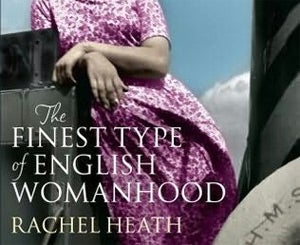The Finest Type of English Womanhood, By Rachel Heath
Cast adrift in post-war desperation

Your support helps us to tell the story
From reproductive rights to climate change to Big Tech, The Independent is on the ground when the story is developing. Whether it's investigating the financials of Elon Musk's pro-Trump PAC or producing our latest documentary, 'The A Word', which shines a light on the American women fighting for reproductive rights, we know how important it is to parse out the facts from the messaging.
At such a critical moment in US history, we need reporters on the ground. Your donation allows us to keep sending journalists to speak to both sides of the story.
The Independent is trusted by Americans across the entire political spectrum. And unlike many other quality news outlets, we choose not to lock Americans out of our reporting and analysis with paywalls. We believe quality journalism should be available to everyone, paid for by those who can afford it.
Your support makes all the difference.The "Porthole Murder" of 1947 was a noir version of Gentlemen Prefer Blondes. A glamorous "actress", as she then was called, was accompanied by her more respectable friend on a sea voyage. But she disappeared from her cabin after having sex with a steward, who was convicted of killing her and disposing of the corpse through the porthole. It was a legally extraordinary case because the prosecution was unable to produce the body.
In this fictional version, the voices of the two girls intertwine, beginning several years before the fatal conclusion. Laura Trelling, daughter of poverty-stricken English gentry, and star-struck Gay Gibson are desperate to escape their oppressive worlds. Rachel Heath is excellent on the atmosphere of post-war Britain and the lure of South Africa.
The women take their own routes to attain this dream, Laura marrying a white South African and Gay getting the fare in return for sexual favours. I found Laura rather too much a gushing schoolgirl in the early episodes, but her life in South Africa and her slow realisation of a wider world as the country slides deeper into racism is compellingly told, reminiscent of the early novels of Doris Lessing. As for promiscuous Gay, there is enough sympathy for this badly educated, desperate woman for her to come across as a real personality and not just a victim. This author is good at sex, writing well about female sensuality.
The interweaving of the lives of Gay and Laura is skilfully handled, the plot ever-thickening as the two move towards that fatal voyage back to Britain. The ship-board cast have their own reasons for allowing the steward to be convicted of murder, when a lesser charge might have been brought.
To dovetail known events with the plotting of fiction is not easy, and there are moments when reality breaks through – the witnessing of Gay's death seems improbable. But the twists keep the reader glued to a novel that would stand out on its own account with no help from criminal history.
Join our commenting forum
Join thought-provoking conversations, follow other Independent readers and see their replies
Comments